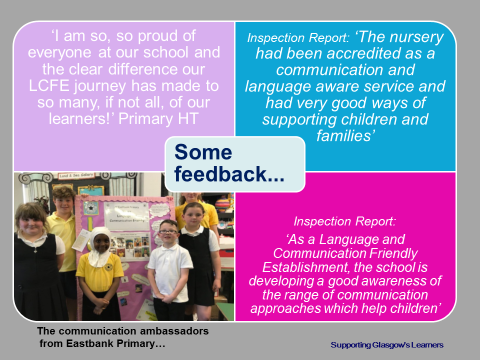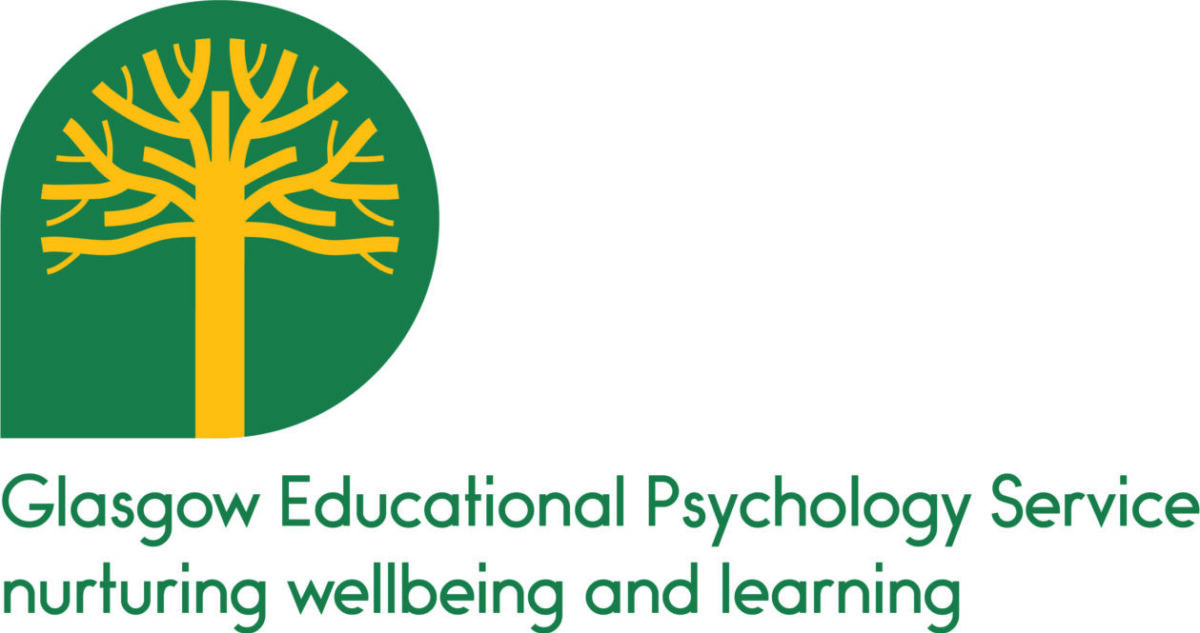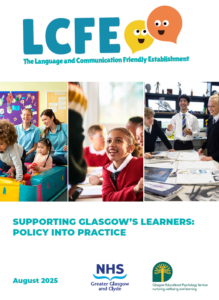Our ability to use language lies at the centre of development and the expression of our emotions, our thinking, our learning, and our sense of personal identity -Curriculum for Excellence
The Language and Communication Friendly Establishment (LCFE) fits with the Scottish Attainment Challenge intervention approach based on effective self-evaluation and improvement planning, including robust measures of impact and progress.
Please watch the video below which gives information on the rationale for creating a Language and Communication Friendly Environment and the indicators that will guide the LCFE self-evaluation journey.
For more information on the literature which informed LCFE and the background to how it was developed please see Glasgow’s LCFE journey document.
The LCFE key indicators framework
The Language and Communication Friendly Establishment Policy Guidelines (August 2025) is the main document for supporting the self-evaluation and implementation of LCFE through use of 5 key indicators which form the basis of supportive practice:
![]() Indicator 1: A calm, welcoming and predictable Physical Environment that enhances opportunities for language and communication experiences for all children (What It Looks Like)
Indicator 1: A calm, welcoming and predictable Physical Environment that enhances opportunities for language and communication experiences for all children (What It Looks Like)
![]() Indicator 2: Adult Talk that encourages and promotes participation from all learners (What You Say)
Indicator 2: Adult Talk that encourages and promotes participation from all learners (What You Say)
![]() Indicator 3: Adult Relational Styles that are responsive and nurturing to children’s social and emotional needs (How You Are)
Indicator 3: Adult Relational Styles that are responsive and nurturing to children’s social and emotional needs (How You Are)
![]() Indicator 4: Creating Supportive Learning Experiences to develop language and communication skills (Help It Happen)
Indicator 4: Creating Supportive Learning Experiences to develop language and communication skills (Help It Happen)
![]() Indicator 5: A strong commitment to ongoing Staff Reflection and Development, promoting language and communication for all children (Taking It Forward)
Indicator 5: A strong commitment to ongoing Staff Reflection and Development, promoting language and communication for all children (Taking It Forward)
LCFE links to 2 KEY NURTURE PRINCIPLES:
-
- Language is a vital means of communication
- All behaviour is communication
The LCFE Flyer provides an overview of the process including information on how to get started.
MENTORING AND SUPPORT
Mentoring and support from key health and education practitioners is a core component of this framework. A mentor could be the Educational Psychologist, Speech and Language Therapist.
The role of the mentor, in partnership with establishment’s LCFE implementation team, is to support and encourage practitioners to manage their own learning and skill development. The mentor will also help staff think about how to achieve the priorities identified in self-evaluation.
This is done through the use of reflective tools and discussions to consider how to make reasonable adjustments to the learning environment (based on the 5 LCFE Indicators) in order to support speech, language and communication development.
THE VALIDATION AND ACCREDITATION PROCESS
This is a four- part process:
-
- Self-Evaluation Framework and Action Plan (as part of establishment Improvement Plan)
- Engagement with coaching and mentoring process
- Validated self-evaluation – supportive visit by LCFE validation team (QIO, SLT/ EP and peer head)
- Follow-up validation every 3 years – discussion with link EP/SLT
Impact
LCFE validated establishments make significantly more use of the evidence-based strategies that speech and language therapist and educational psychologist advise (as evidenced in the recent SLT/ Education Review exercise). They seek more consultation with SLT prior to referring an individual child. Non-validated establishments seek more support than validated. Establishments that are validated use more approaches.

A Focus Group in 2019 with Heads from validated establishments found positive impacts on children and young people, staff, parents and the wider school. For a summary of the findings please see the LCFE focus group summary evaluation on our research page.


